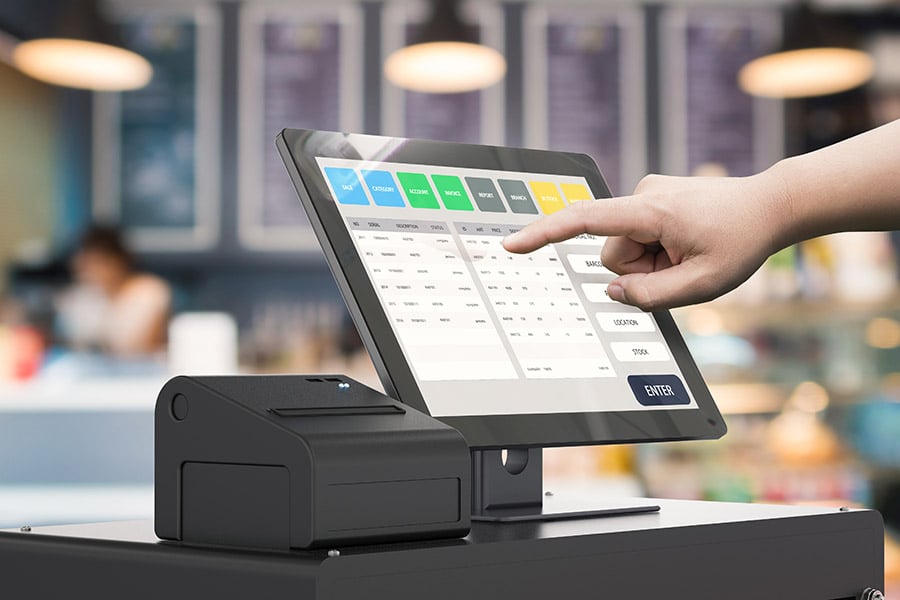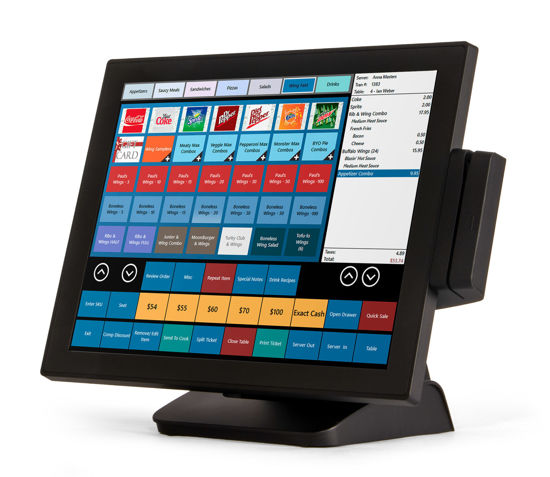Some Known Factual Statements About Pos System For Small Business

Restaurant POS: Retail Point-Of-Sale Solutions Streamline Deals
All About Pos Systems

Hardware Elements of a Point of Sale System What makes a POS system tick? It's not simply software application; the hardware plays a starring function. Think of it as the body to the software's brain. click here Without the right hardware, even the most sophisticated POS software application is simply a pretty face. Necessary POS Hardware So, what are the must-haves? Let's break it down. The central processing unit, frequently a computer system or tablet, is the heart of the operation. The monitor or touchscreen display allows personnel to interact with the system. A barcode scanner speeds up the checkout procedure. Remember the days of by hand entering each code? The reliable receipt printer supplies clients with a record of their purchase. A money drawer keeps your cash safe and arranged. A card reader permits consumers to pay with credit or debit cards. Diving Deeper: Beyond the Essential But wait, there's more! Depending upon your service, you might require specific hardware. For example, a restaurant may include kitchen area printers to relay orders, while a retail shop may use label printers for product tagging. Ever question how your regional pastry shop instantly prints those delicious-looking labels? Selecting the Right Hardware: A Balancing Act Choosing the best hardware isn't practically purchasing the most pricey equipment. It's about discovering the sweet spot between functionality, resilience, and spending plan. A little business simply beginning might choose a more fundamental setup, while a high-volume retailer will require robust, high-performance makers. Is it much better to buy new or used? Consider your alternatives thoroughly. A brand-new system provides the newest technology and service warranty protection, however a reconditioned system can conserve you cash. The Future of POS Hardware What does the future hold? Anticipate to see a lot more combination with mobile gadgets, biometric scanners for worker authentication, and advanced analytics control panels displayed on bigger, clearer screens. Picture a world where stock is instantly upgraded in real-time as products are scanned-- a world where you can track your best-selling product from anywhere in the world. The possibilities are unlimited, and the hardware is continually developing to meet the needs these days's organizations. Are you ready to upgrade your point of sale system?
Software Application Features and Capabilities: The Heart of Your POS System
Ever watch a skilled barista move through a hectic early morning rush? Their trick isn't just caffeine; it's a smooth dance with their POS system. The software is the conductor of your business symphony, managing whatever from sales to stock. What notes should you be listening for? What abilities genuinely matter in today's market?
Inventory Management: Beyond Counting Beans
Forget spreadsheets that haunt your dreams. Modern POS systems provide real-time inventory tracking, alerting you when your stock of artisanal coffee beans dips precariously low. Consider it as a digital guardian angel, avoiding those awkward "Sorry, we're out!" moments to consumers. What if you could likewise anticipate demand based on historic data? Lots of systems now use forecasting tools, an effective weapon against overstocking and lost sales. This assists avoid the circumstance of running out of popular products or building up excess inventory of slow-moving items, both of which can constrain capital and area.
Sales Reporting and Analytics: Translating the Data
Sales data is the brand-new gold, and your POS system is the miner. Forget simply understanding how much you sold today. Dive deep into the data to reveal patterns, recognize your best-selling items, and understand client habits. Which menu item sets completely with the day-to-day special? Which promo resonated most with your customers? These insights are not just fascinating; they're actionable intelligence. Without trustworthy sales reporting, navigating the complexities of company decision-making ends up being like sailing without a compass, increasing the opportunity of errors and missed out on chances.
Client Relationship Management (CRM): Structure Bridges, Not Walls
Keeping in mind a routine client's name and favorite order is charming, but scaling that individual touch is difficult. POS systems with CRM capabilities permit you to track consumer purchase history, preferences, and even birthdays. Think of automatically providing a discount rate on their birthday-- a little gesture that promotes commitment and motivates repeat organization. There is the possible snag of poor data quality, which can lead to incorrect customer profiles and ineffective marketing efforts.
Payment Processing: Enhancing the Deal
The checkout experience can make or break a sale. Smooth integration with various payment techniques-- credit cards, mobile wallets, even copyright-- is non-negotiable. Can your system handle split payments? Does it offer protected tokenization to safeguard consumer data? A clunky payment process resembles hitting a sour note in your organization symphony, possibly interfering with the entire efficiency. Making sure compatibility with evolving payment innovations and adherence to security requirements are critical for keeping client trust and operational efficiency.
Worker Management: Keeping the Team in Sync
From clocking in and out to handling approvals and tracking performance, staff member management features improve operations and enhance responsibility. Is scheduling a nightmare? Many POS systems use integrated scheduling tools, enhancing staffing levels based on forecasted need. A common barrier that is frequently overlooked is the difficulty of integrating worker management functionalities with payroll systems, which can lead to mistakes and inefficiencies in wage estimations.
Advanced Features: Leveling Up Your Operations
- Table Management: Suitable for restaurants, this feature allows you to imagine your dining room, track table status, and manage bookings.
- Commitment Programs: Reward your best clients and motivate repeat service with incorporated commitment programs.
- Online Buying Integration: Seamlessly integrate your POS system with online buying platforms to expand your reach.
Picking the right POS system is about more than simply functionality; it has to do with finding a partner that can grow with your business. Consider your current requirements, expect future development, and don't be scared to ask the tough concerns. The ideal software application can change your organization from a chaotic cacophony into a harmonious work of art.
Industry-Specific POS System Applications
Believe of the local bakery, dynamic with morning clients yearning fresh croissants. A generic POS system might handle transactions, but can it handle complex recipes, track component inventory, or automatically adjust production schedules based upon sales information? Most likely not. That is where the charm of industry-specific POS systems shines.
Restaurants and Hospitality
For dynamic restaurants, speed and accuracy are vital. The number of times have you seen servers handling orders, adjustments, and splitting costs, all while attempting to supply exceptional service? A dining establishment POS system enhances these processes, permitting for table management, kitchen order tickets, and even online purchasing combination. These systems frequently consist of features like ingredient-level inventory tracking, crucial for managing food costs and minimizing waste. Ever wonder why your favorite dish is often not available? It might stem from a lack of appropriate stock management.
- Table Management
- Cooking Area Order Tickets
- Online Buying Integration
- Ingredient-Level Inventory Tracking
Retail Solutions
Retail, with its varied stock and consumer interactions, demands a various set of tools. Think of a boutique clothing shop having a hard time to keep track of sizes, colors, and seasonal collections using a standard checkout system. An industry-specific retail POS system uses functions like barcode scanning, customer loyalty programs, and in-depth sales reporting. These systems can even integrate with e-commerce platforms, supplying a seamless omnichannel experience for consumers. Did you understand some retail POS systems can anticipate future sales patterns based on historical data? Now that is powerful!
The Perils of a Mismatch
Picking the incorrect POS system can produce substantial functional hurdles. A clothes store utilizing a restaurant POS, for instance, would find it inappropriate for handling stock with sizes and colors. The lack of correct reporting and analytics might lead to misinformed acquiring choices and lost revenue. The result could be comparable to trying to fit a square peg in a round hole.
Secret Factors to consider
Picking an industry-specific POS system requires mindful examination. Think of your service's unique needs and functional workflows. Does the system integrate with existing software? Does it use the essential reporting capabilities? Is it scalable to accommodate future development? A well-chosen POS system is not simply a transaction tool; it's a tactical possession that can drive performance, improve consumer fulfillment, and ultimately, improve your bottom line. Remember, it is a financial investment in your organization's future, not simply an expenditure.
Security Considerations for Point of Sale Systems
Ever heard the tale of the mom-and-pop shop that lost whatever since of a single, ignored security defect in their POS system!.?. !? It's a cautionary tale, and it highlights a crucial element frequently eclipsed by the attraction of expensive functions and structured operations. The truth is, a POS system is just as excellent as its security. What good is a system that crunches numbers in a flash if it permits criminals to swipe customer's information just as rapidly?
The Vulnerability Minefield
The digital landscape is a battleground. Every POS system, despite size or elegance, is a potential target. Are you truly got ready for the risks lurking around the corner? The genuine pinch comes when you discover that your out-of-date software application has a gaping hole that hackers can make use of, turning your service into an unwitting accomplice in identity theft. The difficulty is that hackers are crafty and are constantly changing their techniques.
Typical Security Gaps and Specialist Tips
- Weak Passwords: "Password123" isn't cutting it. Use strong, unique passwords for all POS system accounts and alter them regularly. Two-factor authentication is a must.
- Unsecured Networks: Your Wi-Fi resembles leaving the front door open. Protect your network with strong file encryption (WPA3 if possible) and consider a separate network for your POS system.
- Outdated Software Application: Software application vendors patch security holes all the time. Stopping working to upgrade resembles welcoming problem. Establish automatic updates or schedule routine upkeep.
- Worker Training: Your personnel is your very first line of defense. Train them to acknowledge phishing attempts, safeguard passwords, and report suspicious activity.
Information Encryption: Your Shield Versus the Dark Arts
Believe of data encryption as a secret code. It scrambles delicate details, like charge card numbers, making it unreadable to unauthorized users. Without encryption, your clients' monetary information resemble sitting ducks, ripe for the picking by cybercriminals. It's not almost protecting your clients; it has to do with securing your credibility and avoiding significant fines.
PCI Compliance: The Rulebook You Can't Neglect
If you accept charge card, you're bound by the Payment Card Industry Data Security Requirement (PCI DSS) It's a set of security standards created to safeguard cardholder data. Failing to comply can lead to fines, charges, and even the loss of your ability to process credit card payments. It's a headache, yes, but it's a required one. Consider PCI compliance as the expense of doing organization in the digital age.
Consider this: every transaction processed through your point of sale is a possible entry point for harmful stars. By executing robust security steps, you're not simply protecting your company; you're securing your clients' trust and guaranteeing the long-lasting viability of your operations. The security of your POS system isn't simply a technical concern; it's an organization crucial. It requires constant watchfulness, proactive procedures, and a commitment to remaining ahead of the curve.
Comments on “Excitement About Pos System For Small Business”